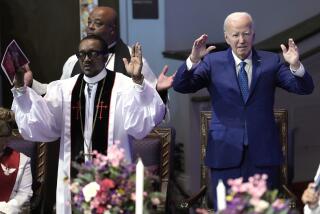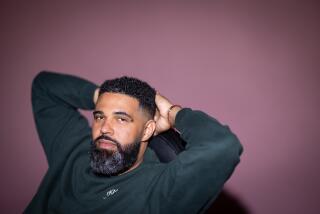Obama’s man of faith has dual roles
Reporting from Washington — The young minister’s alarm goes off at 6 a.m., time for his own devotional and the one he will send to the president of the United States.
This particular morning, Joshua DuBois meditates on the disciple Peter’s first letter to the early church. The text he prays over and e-mails to Barack Obama half an hour later is about something else.
It’s a private start to the day for the president and the pastor, a spiritual BlackBerry session they guard carefully.
Hours later, they meet in a public setting, when the president arrives to give a speech at a community center.
DuBois is wearing an ear bud and carrying a clipboard, standard equipment for a mid-level White House staffer. Obama climbs from his car and greets DuBois and another aide with a casual, “Hey, guys.”
A sheen of perspiration glistens at DuBois’ hairline as the group heads toward the stage area. He keeps a deferential step behind Obama.
Colleagues say DuBois is entitled to a spot on the platform, as director of the White House Office of Faith-Based and Neighborhood Partnerships.
But DuBois has arranged for others from the White House to sit there.
**
“Preaching, I don’t think it comes naturally to me,” he says, a smile materializing within the circle of his goatee. “But working with people, the one on one, that’s the best part of being a minister.”
As it happens, his particular gift is in need at the White House.
Obama hasn’t had a pastor for two years, since he had to answer for a controversial speech by his last one, the Rev. Jeremiah A. Wright Jr.
Now, instead of aligning himself with a church or spiritual leader, the president seeks the guidance of many different people. Some are scholars; some pray in tongues. Some share his progressive views; others say they didn’t even vote for him.
They have one thing in common: DuBois.
In his official job, the 27-year-old Princeton-educated minister is the front door of the White House for religious and community leaders.
In his spare time, he arranges group phone prayer for the president and sets up one-on-one sessions. He solicits written devotionals from others and mixes them in with the ones he personally prepares. And he zealously guards the words that pass between him and the president.
“With Joshua, it’s never about Joshua,” says White House aide and DuBois’ mentor, Michael Strautmanis. “It’s always about the other person — regardless of who that might be.”
As the community center event begins, the young minister takes his place in the wings to watch.
**
DuBois showed up at Obama’s offices five years ago, in some ways a younger version of the then-senator from Illinois — a black man with Ivy League credentials and a brilliant father who bounced in and out of his life.
DuBois had a master’s degree in public policy and experience on Capitol Hill, not an uncommon pedigree for young Democrats knocking on Obama’s door.
Something set DuBois apart, though. He was a Pentecostal minister, ordained by the church he attended as an undergraduate at Boston University.
He had grown up in Tennessee and Ohio with a stepfather who is a minister in the African Methodist Episcopal Church. In college, a friend had introduced him to Pentecostalism, a strain of Christianity with a livelier worship style that includes prayer in unknown languages.
Pentecostals tend toward conservative views. They aren’t usually Democrats.
DuBois was drawn to Obama because of his speech at the 2004 Democratic National Convention. Obama spoke of worshiping “an awesome God.”
The staff put DuBois to work researching bills.
One day in 2006, at work on a speech, Obama turned to his deputy chief of staff for help brainstorming biblical passages. Strautmanis thought of the young preacher down the hall.
“I took him in, and they started talking,” Strautmanis recalls, “and pretty soon I realized my time would be well-spent on something else.”
DuBois soon took charge of religious outreach for Obama, the only Senate Democrat to name such a point person.
Shortly after his presidential campaign began, Obama prayed with ministers at a breakfast DuBois put together in South Carolina. On the next visit there, Obama met with the ministers and, this time, asked to pray privately.
As the campaign continued, DuBois assembled friendly pastors to pray with Obama in any quiet space he could find — hallways, backstage, locker rooms.
**
In 2008, in the thick of the Democratic primary, the Wright controversy became a roaring fire. DuBois was one of several advisors who consulted with Obama on the speech that would try to calm the situation.
For the rest of the campaign, Obama attended church as candidates do. Cameras recorded his entry. Journalists noted whether he bent his head in prayer.
Now that he is president, Obama’s presence in church is even more disruptive.
“We’ve talked about this,” says Joel Hunter, evangelical pastor of Northland, a Church Distributed in Longwood, Fla., who prays with the president and writes some of the devotionals that DuBois sends. “It turns into a circus, and he feels badly about that.”
Though Obama attends church on trips to Camp David, he rarely does so outside the presidential retreat in Maryland.
But Obama, says Hunter, “has found a way to get what he needs on a private basis.”
In his formal position, DuBois coordinates the work of faith-based centers within 12 federal agencies, and he directs groups tackling such issues as teen pregnancy, adoption and poverty.
In the process, he consults clergy leaders from all religious traditions.
“I believe we provide pastoral insight to the president,” said the Rev. Samuel Rodriguez, president of the evangelical National Hispanic Christian Leadership Conference. “Joshua helps us to do that.”
DuBois says he primarily conveys their thoughts to the president’s senior team, working up the food chain through his direct supervisor, domestic policy chief Melody Barnes. But informally, he has a direct line to the president. This spring, as the two rode in a limousine, they talked about the victims of a West Virginia mine explosion.
DuBois brought up the “valley of the shadow of death” in the 23rd Psalm. When Obama spoke to the miners’ families, he quoted the passage.
DuBois usually prays with the president by speaker phone from his office at Jackson Place, a White House annex. Frequent guests are Bishop Charles Blake of the Church of God in Christ, a conservative-leaning church, and the Rev. Sharon Watkins, head of the more progressive Christian Church (Disciples of Christ).
“I get them on the phone,” DuBois says of the other ministers, “but their connection is with the president. They’re friends of his now. They know his heart.”
**
And then there are the devotionals, the private messages of faith sent each morning about 6:30 to Obama’s BlackBerry.
DuBois chooses passages from religious texts that range from the Bible to the Anglican Book of Common Prayer to meditations by established writers. Lately, he has consulted the classic collection of meditations “My Utmost for His Highest,” by turn-of-the-century evangelist Oswald Chambers.
When asked, DuBois will pray with colleagues, in the office stairwell or at their homes. He is sometimes accompanied by his girlfriend of six years, an attorney at the Department of Justice, and, before her, the cats he hated to leave alone at his apartment. (His girlfriend is allergic to the cats. High Five and Shirley now live with another staffer.)
DuBois seems to anticipate moments of need, says Ashley Tate-Gilmore, who was Obama’s Senate assistant and now works in the White House travel office.
Obama would say, “Let’s get Joshua in here,” she says, and DuBois was often there before she looked up from the phone.
**
On stage at the community center, Obama is speaking about responsible fatherhood, a topic of special importance to him. His father left when he was a toddler.
“We know that when fathers abandon their responsibilities, there’s harm done to those kids,” Obama tells the audience. “It’s something that leaves a hole in a child’s life that no government can fill.”
Heads nod. One of them is DuBois’.
After his parents’ marriage ended, DuBois and his mother struggled at times.
Shortly after learning that his father had died, in 2006, DuBois was called to the senator’s office. Obama put an arm around him and offered words of comfort.
DuBois says he was drawn to Obama partly because of that personal affinity, but also by his view that problems like parental absence, poverty and abortion are interwoven with values and culture. He liked Obama’s belief that effective solutions involve religious leaders.
Faith-based organizations “are on the front lines of some of the most difficult challenges we’re facing as a nation,” DuBois says. “This is driven by need.”
**
When Obama finishes his speech, DuBois walks with him toward the back driveway and watches the motorcade pull away, lights flashing.
DuBois heads back inside to close out the event. The congregation is leaving the auditorium, and he wants to be there.
More to Read
Sign up for Essential California
The most important California stories and recommendations in your inbox every morning.
You may occasionally receive promotional content from the Los Angeles Times.











